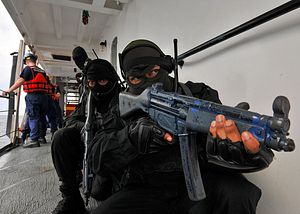Former Secretary General of the United Nations Kofi Annan once said that arguing against globalization is like arguing against the laws of gravity. He was referring to the fact that the evolution of networks, trade, and technology had started unstoppable processes connecting people and places around the world.
We are now witnessing some significant downsides that accompany globalization, such as the migration of terrorist fighters and transnational organized crime. Southeast Asia is no exception, with countries of the region and the Association of Southeast Asian Nations (ASEAN) moving quickly to integrate and develop into an “economic community,” while at the same time struggling to keep pace with dynamic and growing security threats.
The reality is that most developing and middle income countries lack the systems and capacities necessary to address transnational threats, and governments are increasingly overwhelmed by the rapid increase in cross-border movements of different kinds. Meanwhile regional and international organizations often have intentionally limited mandates and are under-resourced to provide a coherent response, leaving many countries and regions susceptible to transnational threats.
Terrorism is the most immediate and visible challenge. While terrorist ideology continues to place the West and Western symbols in its cross-hairs – illustrated over the past year by attacks in Paris, Jakarta, Brussels, and most recently New York – it is vulnerable and fragile states of the Middle East, Africa, and Asia that suffer most from terrorist violence.
The ability of terrorist movements like Daesh or Islamic State (ISIS) to control large swaths of territory in the Middle East has emboldened those that adhere to their twisted world view. The group has attracted radicalized youth from every corner of the earth, including from Southeast Asia – it is estimated up to 1,500 have traveled from the region to fight for the so-called caliphate. Battle-hardened fighters have started to return, and as things deteriorate for Daesh in Iraq and Syria the exodus may accelerate quickly, with some looking for the next place with a weak rule of law to set up and fight. Others will return with the intention to mix back into society. Regardless, they will come back with new and dangerous skills, ideas, and contacts.
Less visible but nonetheless linked, and arguably even more destructive, is transnational organized crime. While the media occasionally cover stories about different forms of trafficking or smuggling, they often fail to grasp the complex and transnational nature of these crimes. The fact is criminal networks are managing operations stretching across Southeast Asia or connecting the region to different regions. The association of criminal and terrorist organizations is also not well understood – Daesh and other terrorist groups are funded by the proceeds of different types of transnational crime and illegal money flows.
The latest research of the United Nations Office on Drugs and Crime puts the global value of transnational crime at a staggering $1 trillion per year – on par with some G20 economies. And here in Southeast Asia the figure is conservatively estimated at over $100 billion dollars per year. As with terrorists, organized crime are most destructive in countries and regions with a weak rule of law, where the opportunity to corrupt officials and run operations unimpeded is remarkably easy. At the same time criminal organizations are increasingly able to conceal their operations and finance among global and regional movements of people and trade, ultimately targeting high-value markets where significant profit can be made.
A fundamental change is needed in the way we approach these challenges. It is not sustainable for countries to continue to address terrorism or transnational crime from a narrow national interest perspective, nor can development be viewed as a standalone endeavor independent from security. Integration processes are exposing vulnerabilities and governments are being left with no choice but to acknowledge that trade, development, and security agendas are interrelated. In essence, countries are being forced to cooperate and collaborate on security matters as a result of economic integration.
To provide a comprehensive answer to the threats posed by transnational crime and terrorism in Southeast Asia, regional security and development agendas need to be connected and coordinated. ASEAN and the UN have a direct interest, and in fact a responsibility, to ensure that related efforts are comprehensive and have the resources necessary to respond quickly to the downsides of integration. The alternative is not an option.
Jeremy Douglas is the Regional Representative for the United Nations Office on Drugs and Crime (UNODC) for Southeast Asia and the Pacific, and former UNODC Representative for Pakistan.

































